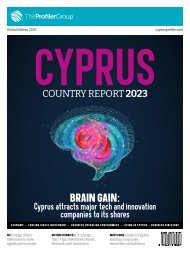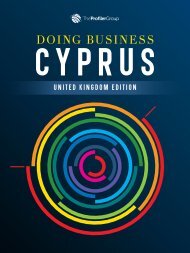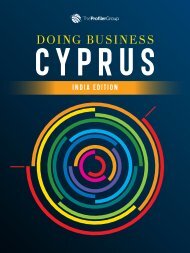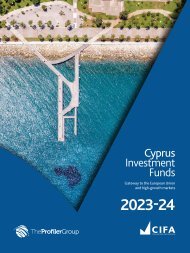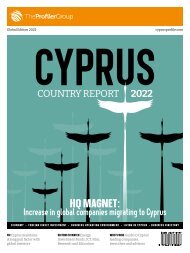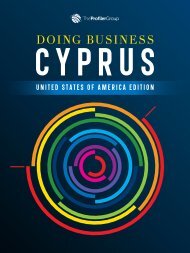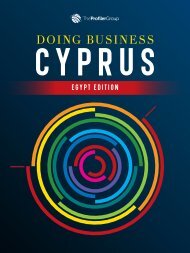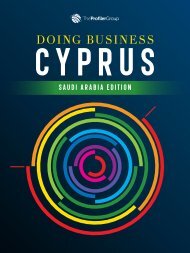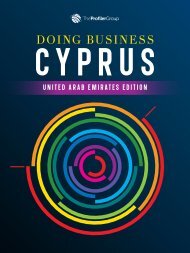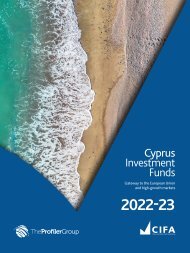2020 Cyprus Country Report
The 2020 Cyprus Country Report features in-depth articles on the economy, foreign direct investment, international trade and headquartering as well as detailed sector profiles and insights from Cyprus’ 100 most influential political, economic and business leaders shaping the future of their country and its industries.
The 2020 Cyprus Country Report features in-depth articles on the economy, foreign direct investment, international trade and headquartering as well as detailed sector profiles and insights from Cyprus’ 100 most influential political, economic and business leaders shaping the future of their country and its industries.
You also want an ePaper? Increase the reach of your titles
YUMPU automatically turns print PDFs into web optimized ePapers that Google loves.
Government & Politics<br />
A Key EU Outpost<br />
As the European Union’s easternmost member state, <strong>Cyprus</strong> has established<br />
itself as a geostrategic EU outpost at the crossroads of three continents.<br />
As an international business centre and with global cooperation in<br />
multiple sectors, <strong>Cyprus</strong>’ reach goes far beyond its borders, with <strong>2020</strong> also<br />
bringing new efforts to finally reach a solution for this divided island.<br />
The Republic of <strong>Cyprus</strong> is a unitary presidential<br />
representative republic, where the<br />
President of <strong>Cyprus</strong> is both head of state and<br />
head of government, and executive power is<br />
exercised by the government. Legislative power<br />
is vested in both the government and the parliament,<br />
and the judiciary is independent of the executive<br />
and the legislature. The seventh president<br />
of the Republic of <strong>Cyprus</strong>, Nicos Anastasiades,<br />
was re-elected for another five-year term on 4<br />
February 2018. The conservative candidate and<br />
head of the DISY party won his second term<br />
following a run-off presidential election with a<br />
majority of 55.99% of the vote. Embarking on<br />
his second term in office, the President called for<br />
unity to address future challenges.<br />
At the start of his first term, <strong>Cyprus</strong> suffered a<br />
major financial crisis, and President Anastasiades<br />
had to take robust measures to steer the country<br />
back on track from one of the most challenging<br />
economic times in the island’s history. The<br />
economy bounced back swiftly returning to<br />
growth in 2015, investment grade rating in 2018<br />
and recording an average GDP growth of 5.4%<br />
in 2016-19, making <strong>Cyprus</strong> one of the fastest<br />
growing economies in the European Union. In<br />
<strong>2020</strong>, this growth momentum has been stalled by<br />
the consequences of the Covid-19 pandemic, but<br />
with strong action and robust support packages<br />
in place the country has fared better than many<br />
of its European peers.<br />
The division of <strong>Cyprus</strong> remains one of the<br />
most long-standing and prominent issues in the<br />
political arena. UN-brokered peace talks between<br />
the Greek and Turkish Cypriot leaderships,<br />
which first began in 1968, had gained significant<br />
momentum in 2015 only to collapse in 2017.<br />
In October this year, following the presidential<br />
election win of Ankara-backed Turkish Cypriot<br />
leader Ersin Tatar, the ‘<strong>Cyprus</strong> Problem’, which<br />
led to the de facto division of the island between<br />
the mainly Greek-speaking south and the mainly<br />
Turkish-speaking north for over four decades,<br />
may have become a tougher puzzle to solve. The<br />
change in leadership comes amid rising ten-<br />
sions between <strong>Cyprus</strong>, Greece and Turkey over<br />
hydrocarbons explorations in <strong>Cyprus</strong>’ Exclusive<br />
Economic Zone (EEZ) and the controversial<br />
partial reopening of the coastal city of Varosha<br />
in Famagusta. However, the new Turkish Cypriot<br />
leader has already accepted Cypriot President<br />
Nicos Anastasiades' offer to resume talks, backed<br />
by the encouragement from the UN and the EU<br />
to show “constructive engagement”.<br />
DIVIDED ISLAND<br />
In 1960 <strong>Cyprus</strong> gained independence from<br />
Britain and became a unitary state of both Greekand<br />
Turkish-Cypriots (respectively around 80%<br />
and 20% of the population). In July 1974, a rightwing<br />
coup backed by the military junta in power<br />
in Greece overturned the democratically elected<br />
government, forcing the Cypriot President<br />
Archbishop Makarios to flee. This prompted<br />
Turkey, one of the guarantor powers, which also<br />
include Greece and the UK, to send its troops<br />
into the island to support the Turkish Cypriot minority.<br />
Fierce fighting followed and the ensuing<br />
ceasefire line – known as the Green Line and patrolled<br />
by United Nations troops – has effectively<br />
partitioned the island ever since. However, visitors<br />
can safely access either side through various<br />
checkpoints along the Green Line. Today, Nicosia<br />
is the world’s last divided capital, since the fall of<br />
Political Parties<br />
Constitution, Institutions<br />
and Administration<br />
The 1960 constitution provided<br />
for power sharing between<br />
the Greek Cypriot and Turkish<br />
Cypriot communities. Votes<br />
on important issues required<br />
separate parliamentary<br />
majorities, and the Greek<br />
Cypriot president and the<br />
Turkish Cypriot vice president<br />
both had the right of veto<br />
on important decisions.<br />
The system of government<br />
is presidential, with the<br />
separation of powers between<br />
the executive and the<br />
legislature. The presidential<br />
term lasts five years, with the<br />
next presidential election due<br />
in 2023. Ministers, who are<br />
appointed by the president,<br />
cannot hold seats in the<br />
House of Representatives.<br />
The House of Representatives<br />
is elected by proportional<br />
representation. Its normal<br />
term is five years.<br />
Dominant Political Parties:<br />
Democratic Rally (DISY), a right-wing party led by Averof Neophytou<br />
Progressive Party of the Working People (AKEL), a left-wing party led by Andros Kyprianou<br />
Democratic Party (DIKO), a centre-right party led by Nicolas Papadopoulos<br />
Movement of Social Democracy (EDEK), a social democratic party led by Marinos Sizopoulos<br />
Smaller Political Parties:<br />
Ecologists Movement, also known as the <strong>Cyprus</strong> Green Party, led by Charalambos Theopemptou<br />
Allileggii (Solidarity), a nationalist party led by Eleni Theocharous<br />
Citizens’ Alliance (Symmaxia Politon), a centre-left party led by Giorgos Lillikas<br />
National People’s Front (E.L.A.M.), an ultranationalist party led by Christos Christou<br />
16 <strong>Country</strong> <strong>Report</strong> CYPRUS <strong>2020</strong>



